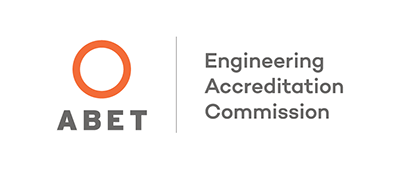- Home |
- Accreditation
Accreditation
The B.S. program in Computer Engineering and the B.S. program in Electrical Engineering are accredited by the Engineering Accreditation Commission of ABET, https://www.abet.org, under the General Criteria and Program Criteria for Electrical, Computer, Communications, Telecommunication(s), and similarly named engineering programs.

Electrical Engineering
Program Educational Objectives
Alumni, employers, faculty and students participate in a process used to develop educational objectives for the undergraduate programs in Electrical Engineering. Within a few years of graduation, program graduates completing the baccalaureate degree in Electrical Engineering will
- Be recognized by their peers as fundamentally sound in the application of mathematics, science, computing, and engineering.
- Be engaged in the practice of Electrical Engineering as innovative problem solvers with a strong work ethic, by identifying and implementing solutions using the proper tools, practical approaches, and flexible thinking.
- Be productive and demonstrate leadership in the practice of Electrical Engineering, both individually and within multidisciplinary teams, using effective oral and written communication skills when working with peers, supervisors, and the public.
- Be responsible in the practice of Electrical Engineering, relying on sound engineering ethics, a commitment to lifelong learning and a genuine concern for society and the environment.
Student Outcomes
1. an ability to identify, formulate, and solve complex engineering problems by applying principles of engineering, science, and mathematics
2. an ability to apply engineering design to produce solutions that meet specified needs with consideration of public health, safety, and welfare, as well as global, cultural, social, environmental, and economic factors
3. an ability to communicate effectively with a range of audiences
4. an ability to recognize ethical and professional responsibilities in engineering situations and make informed judgments, which must consider the impact of engineering solutions in global, economic, environmental, and societal contexts
5. an ability to function effectively on a team whose members together provide leadership, create a collaborative and inclusive environment, establish goals, plan tasks, and meet objectives
6. an ability to develop and conduct appropriate experimentation, analyze and interpret data, and use engineering judgment to draw conclusions
7. an ability to acquire and apply new knowledge as needed, using appropriate learning strategies.
Computer Engineering
Program Educational Objectives
Alumni, employers, faculty and students participate in a process used to develop educational objectives for the undergraduate programs in Computer Engineering. Within a few years of graduation, program graduates completing the baccalaureate degree in Computer Engineering will
- Be recognized by their peers as fundamentally sound in the application of mathematics, science, computing, and engineering.
- Be engaged in the practice of Computer Engineering as innovative problem solvers with a strong work ethic, by identifying and implementing solutions using the proper tools, practical approaches, and flexible thinking.
- Be productive and demonstrate leadership in the practice of Computer Engineering, both individually and within multidisciplinary teams, using effective oral and written communication skills when working with peers, supervisors, and the public.
- Be responsible in the practice of Computer Engineering, relying on sound engineering ethics, a commitment to lifelong learning and a genuine concern for society and the environment.
Student Outcomes
1. an ability to identify, formulate, and solve complex engineering problems by applying principles of engineering, science, and mathematics
2. an ability to apply engineering design to produce solutions that meet specified needs with consideration of public health, safety, and welfare, as well as global, cultural, social, environmental, and economic factors
3. an ability to communicate effectively with a range of audiences
4. an ability to recognize ethical and professional responsibilities in engineering situations and make informed judgments, which must consider the impact of engineering solutions in global, economic, environmental, and societal contexts
5. an ability to function effectively on a team whose members together provide leadership, create a collaborative and inclusive environment, establish goals, plan tasks, and meet objectives
6. an ability to develop and conduct appropriate experimentation, analyze and interpret data, and use engineering judgment to draw conclusions
7. an ability to acquire and apply new knowledge as needed, using appropriate learning strategies.
